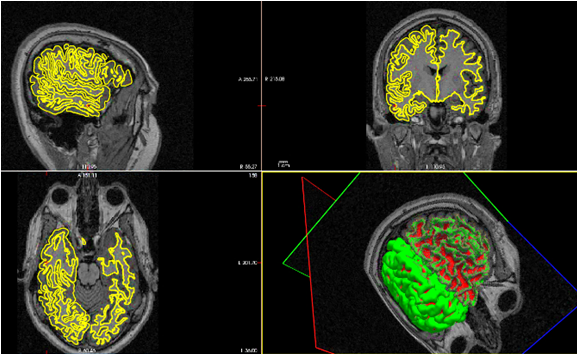Mapping Brain Structural Changes in Patients with Diabetes Can Help to Save Lives
20.04.2020

The research team of Siberian State Medical University is investigating brain structural changes in patients with type 1 and 2 diabetes. The study aims to develop a novel approach to individualized therapy. Maria Matveeva (Cand.Med.Sci., assist. Prof of the Division of Endocrinology and Diabetology) is leading this study, in close collaboration with other eminent researchers.
In 2011, while still a postgraduate student, Maria Matveeva had expressed her interest in studying cognitive impairments in patients with diabetes. In 2015 she defended her dissertation for the degree of Candidate of Medical Science: ‘Markers for early Identification of Cognitive Impairment in Patients with Type 1 Diabetes (T1D)’. In 2020 theresearch team has received ‘The Scholarship of the President of the Russian Federation for strengthening state support of young Russian scientists - candidates and doctors of sciences.’ The funding will allow researchers to examine in greater detail the capacity for neuroplasticity in patients with diabetes, broaden the scope of the research, and involve international researchers with unique and valuable knowledge to contribute to the project.
Diabetes mellitus (DM) is a chronic progressive disease. It results from the body's inability to produce enough insulin or to respond to the hormone insulin. In 2018, the World Health Organization (WHO) had published a global report on diabetes; it was shown that more than 400 million people worldwide are living with diabetes. According to the report, diabetes is one of the leading causes of blindness, kidney failure, heart attacks, and strokes.
The research innovates by investigating the neurodegeneration (progressive loss of structure or function of neurons, including the death of neurons – editor’s note) in patients with diabetes and obtaining structured information on cognitive impairment (memory loss and lower productivity – editor’s note) in patients with diabetes. Furthermore, there is a lack of comprehensive data on indicators of functional and structural changes in the brain.

The research project will consist of five pillars:
- longitudinal comparative interventional unblinded study based on analysis of factors influencing neuroplasticity in patients with Type 1 and Type 2 diabetes;
- retrospective study: evaluation of the dynamics of cognitive functions in patients with diabetes who haven’t received treatment for the last five years;
- prediction of the development of future cognitive impairment, development of diagnostic and treatment strategies from the perspective of personalized medicine;
- approbation and utilization of research results;
- implementation of research results in clinical practice.
As the study unfolds, the researchers plan to identify domains of cognitive functions that are impaired in patients with type 1 and type 2 diabetes. Also, brain regions, the size of these regions, and areas associated with cognitive impairment depending on the type of diabetes will be determined. Besides, anamnestic, metabolic, and social factors will be identified. These factors will help to develop the risk scale for selecting patients for further examination. The research results will help to determine the relationship between antihyperglycemic drugs and neuroplasticity (the ability of the brain to form and reorganize synaptic connections – editor’s note.). Maria Matveeva is convinced that the research results will prove useful both to neurologists and endocrinologists. The results can be used as a tool for diagnosing and predicting cognitive impairment. Most importantly, these results will allow preventing and providing timely treatment for patients with diabetes.
The research project has excellent prospects, though, because this research project aims to answer the fundamental questions of science. The results obtained will expand knowledge and understanding of the neuroplasticity to develop a new personalized approach to the treatment of diabetes.
To find out more information on the research, please check out the most recent articles:
- Matveeva, M. V., Samoilova, Y. G., Zhukova, N. G., Ratkina, K. R., & Yakimovich, I. Y. (2019). Different types of cognitive rehabilitation in patients with type 2 diabetes. Zhurnal Nevrologii i Psihiatrii Imeni S.S. Korsakova, 119(8), 12–17. https://doi.org/10.17116/jnevro201911908112
- Koshmeleva, M. V., Samoilova, I. G., Kobyakova, O. S., Kudlay, D. A., Oleynik, O. A., Matveeva, M. V., … Tolmachev, I. V. (2019). Experience of using technologies for remote monitoring of type 1 diabetes mellitus at the stage of outpatient healthcare. Pediatriya - Zhurnal Im G.N. Speranskogo, 98(5), 219–224. https://doi.org/10.24110/0031-403X-2019-98-5-219-224
- Matveeva, M. V., Samoilova, Y. G., Zhukova, N. G., Kudlay, D. A., Rotkank, M. A., & Leyman, O. P. (2019). Rare genetic markers of cognitive impairment in diabetes mellitus. Zhurnal Nevrologii i Psihiatrii Imeni S.S. Korsakova, 119(2), 76–79. https://doi.org/10.17116/jnevro201911902176
- Samoilova, Y. G., Rotkank, M. A., Zhukova, N. G., Matveeva, M. V., Tolmachev, I. V., & Kudlay, D. A. (2018). Markers for cognitive impairments and variability of glycaemia in patients with type 1 diabetes mellitus. Zhurnal Nevrologii i Psihiatrii Imeni S.S. Korsakova, 118(4), 48–51. https://doi.org/10.17116/jnevro20181184148-51
- Samoilova, I. G., Rotkank, M. A., Zhukova, N. G., Matveeva, M. V., Tolmachev, I. V., & Kudlay, D. A. (2018). Variability of glycemia in patients with type 1 diabetes mellitus: The relationship with cognitive dysfunction and the results of magnetic resonance imaging. Problemy Endokrinologii, 64(5), 286–291. https://doi.org/10.14341/probl9589
